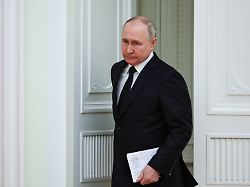Since the uprising by Wagner boss Prigozchin, Putin has appeared in front of the camera three times. In his first speech, he initially spoke of treason, but in the days that followed, the Kremlin chief suddenly showed leniency. There is an important message behind the transformation.
An unwritten rule in Russia is that nobody messes with the president. Criticism of the government is possible – but not of the head of state, which is taboo. There was no doubt about that until last weekend. Then mercenaries from the Wagner group took over a regional military command, marched 800 kilometers across Russia, shot down planes and helicopters, killed Russian soldiers – and then broke off the whole operation a few hours later.
Putin’s reaction to it is even more absurd than the failed uprising itself, which, according to Wagner boss Yevgeny Prigozhin, was supposedly not a coup at all. After describing Prigozhin’s actions in an initial speech as a mutiny that would “inevitably be punished,” he made a 180-degree turn in the days that followed. “Traitors” suddenly become “patriots” and there is no longer any talk of criminal prosecution. How does that fit into the image of the eternal ruler whom no one should stand in his way?
In the 23 years that Putin has been in power, several rivals have lost out in a duel with the Kremlin boss and have gone either into exile, into prison or into anonymity. A fall from the balcony or a poison attack, as recently with Kremlin critic Navalny, is not unusual. Boris Nemtsov was shot dead in Moscow in 2015. Navalny and Nemtsov opted for public protest. With his rebellion, Prigozhin chose a different path that only one who has an army of heavily armed soldiers behind him can take: military confrontation.
Putin is trying to limit the damage
When the whole world watched on Saturday as Prigozhin set his troops in motion towards Moscow, the Kremlin seemed frozen. Putin spoke of a “dagger in the back” and threatened to punish all those “who deliberately chose the path of blackmail and terrorist methods.” But instead of intervening and stopping the advance, he allowed the Wagner fighters to march unhindered to almost 200 kilometers from Moscow’s gates.
Prigozhin then contradicted Putin publicly for the first time: “The president is seriously mistaken,” he said in a voice message on his Telegram channel. “We are patriots of our homeland”. Nevertheless, he recalled his troops shortly before Moscow and asserted that the uprising was never aimed at Putin – but solely at the poor military leadership and those responsible, Defense Minister Sergei Shoigu and Commander-in-Chief Valery Gerasimov. But too late: the image of the strong man had faltered.
Putin tried damage control. In another speech on Monday, the first since the Wagner mercenaries turned back, he gave an explanation for the inaction of the security organs: On his orders, everything had been done to prevent bloodshed. “It took time,” Putin said in the speech broadcast by state television, claiming: “The armed uprising would have been crushed that way.”
“If cornered, Putin saves himself”
What he then said stunned many observers. Instead of the announced punishment, Putin thanked the Wagner mercenaries and praised them: According to Putin, most of the members are also patriots who made the right decision to turn around and not fight their brothers. He did not mention the 15 Russian soldiers who were killed by the militia during the march. Instead, he promised the Wagner fighters impunity and gave them the choice of joining the Russian army, going home to their families, or following their boss, Prigozhin, to Belarus.
For US historian Timothy Snyder, Putin’s sudden change of heart can only be explained by ducking away. “If he is cornered, Putin saves himself,” writes Snyder in an analysis. The West’s constant fear of what the Kremlin boss might do if he feels threatened is obviously unnecessary, according to the Yale University professor. Because despite his constant threats to the West about “escalations” and now to Prigozhin and Wagner, his actions speak a different language: First he lets his lapdog Alexander Lukashenko negotiate a deal with Prigozhin, then he drops all charges against him.
In another speech this morning, Putin tries to paint a narrative that has little to do with reality. The “people” who were “pulled into the rebellion” saw that the army and the people “were not on their side,” he claims. In fact, videos from Rostov-on-Don show the exact opposite: there, Russian citizens cheered the Wagner mercenaries on their departure. Putin also thanks the Russian soldiers for preventing a “civil war” – although none of them opposed the Wagner mercenaries.
As long as Putin is in power, it’s his ploy, Snyder said. Threaten and hope that the threats will have an effect. “If he doesn’t succeed, he will change history.” With his transformation from tiger to kitten, Putin has exposed himself.
